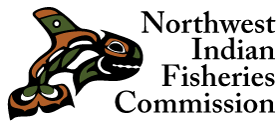Nooksack Tribe to Catalog Problem Culverts
Categories: News
DEMING (March 17, 2003) — Some good news for wild salmon: the tributaries of the Nooksack River contain very high quality spawning habitat. The bad news? Much of that habitat is inaccessible to fish, because failed or improperly installed culverts block access.
Fortunately, there’s more good news on the way: the Nooksack Tribe’s Natural Resources department will inventory culverts throughout the area beginning this spring. They will measure spawning and rearing habitat above the barriers, finding the most important culverts to repair immediately.
“Fixing impassable culverts is one of the quickest and most effective ways to restore habitat for our wild salmon,” said Bob Kelly, Director of Nooksack Natural Resources (NNR). “Our main goal is to recover those wild fish populations, including the threatened spring chinook, and the research we’re doing right now will help us do just that.”
NNR will assemble existing barrier information, prioritize field surveys using Geographic Information Systems analysis, then inventory barriers and conduct habitat surveys upstream of blockages. This information is critically important to prioritize restoration projects in the North, South and Middle Forks of the Nooksack River: culverts blocking the most high-quality habitat in Water Resources Inventory Area 1 (WRIA 1) that can be removed economically will be moved to the top of the list.
“During this project, we’ll cover a lot of miles,” said Nooksack habitat biologist Chuck Sauvageau, who is serving as field supervisor for the effort. “We’re hoping to get over 600 miles of stream habitat catalogued throughout WRIA 1.”
“Throughout Washington State, culverts block an estimated 4,500 river miles of historic salmon habitat,” said Kelly. “If we can solve this problem right here in our own watershed, that will be a huge step toward bringing back the salmon.”
Nooksack crews are being trained in how to perform the assessment work on March 18, and are scheduled to begin work on April 1. The project is funded through a Salmon Recovery Funding board grant obtained by Whatcom County last year.
-End-
For more information, contact: Bob Kelly, Nooksack Tribe, 360.592.2632; Jeff Shaw, Northwest Indian Fisheries Commission, 360.424.8226; 360.481.3541 cellular.

Comments are closed.